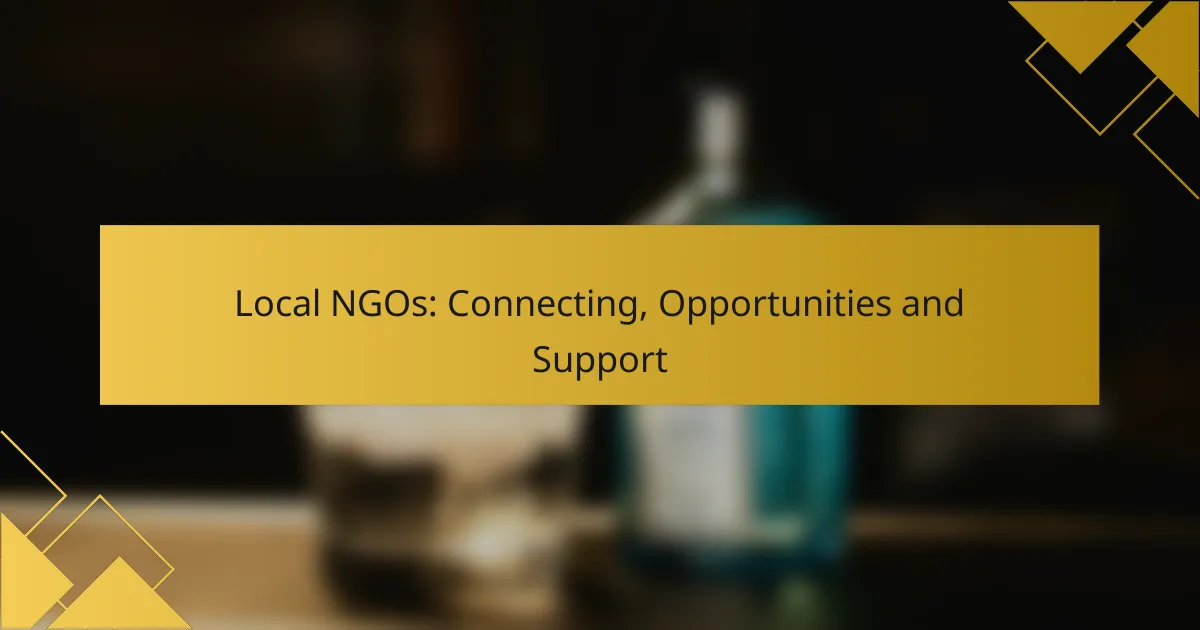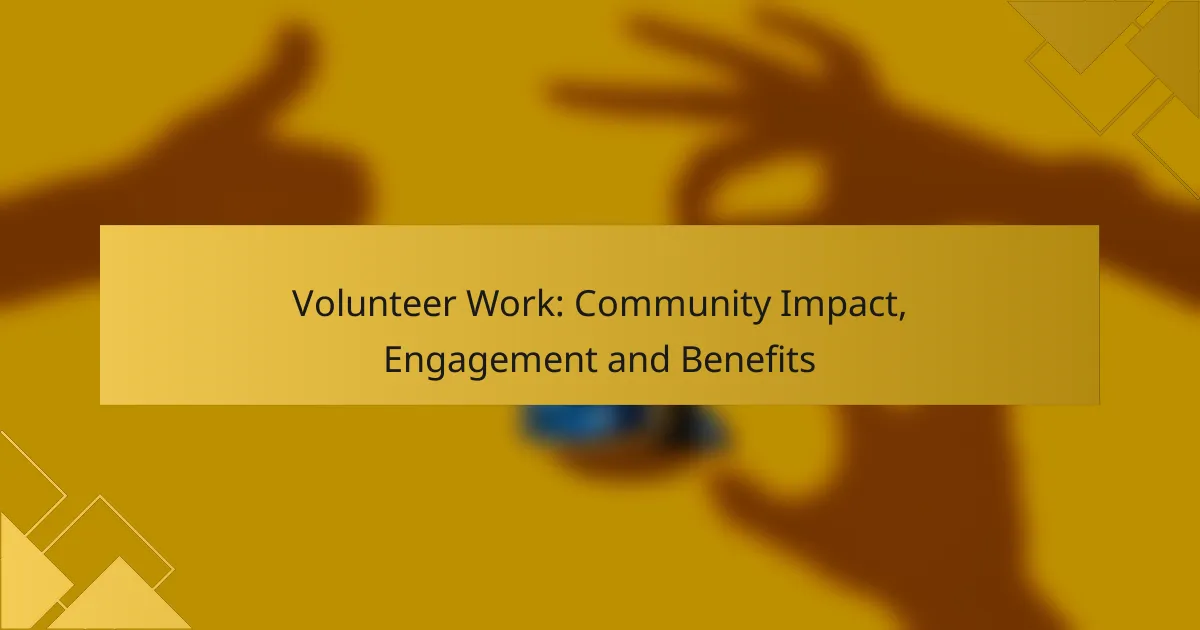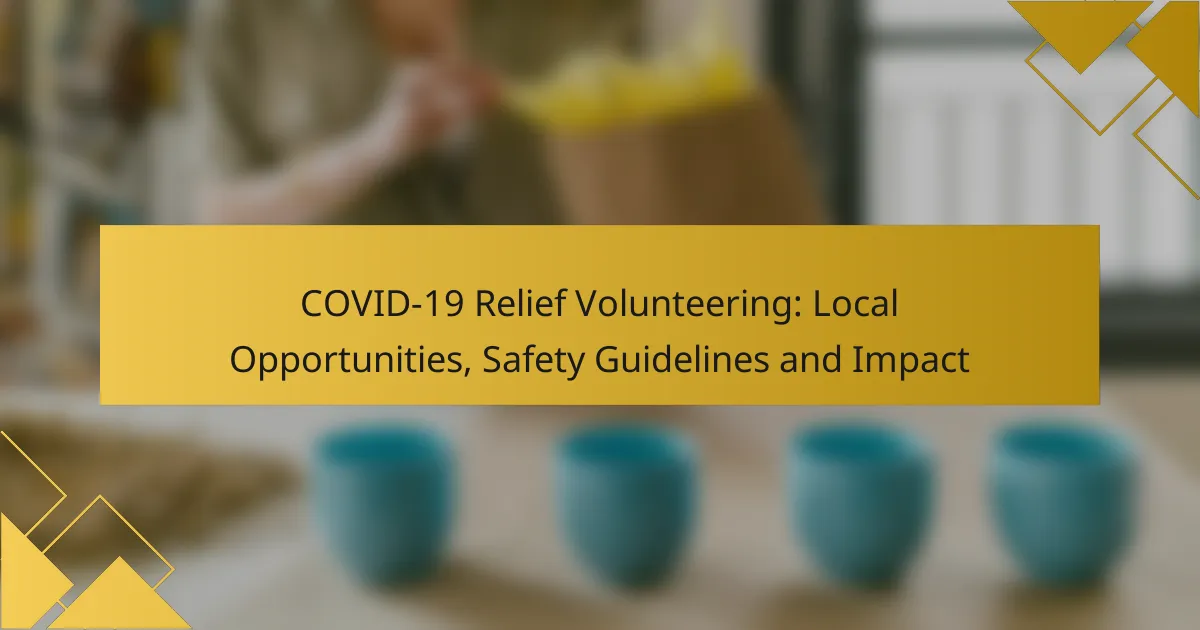Local NGOs serve as vital connectors within communities, employing diverse strategies to foster engagement and collaboration. By offering opportunities such as job training, grant funding, and networking events, they enhance community development while providing essential support to vulnerable populations through targeted services and resources.
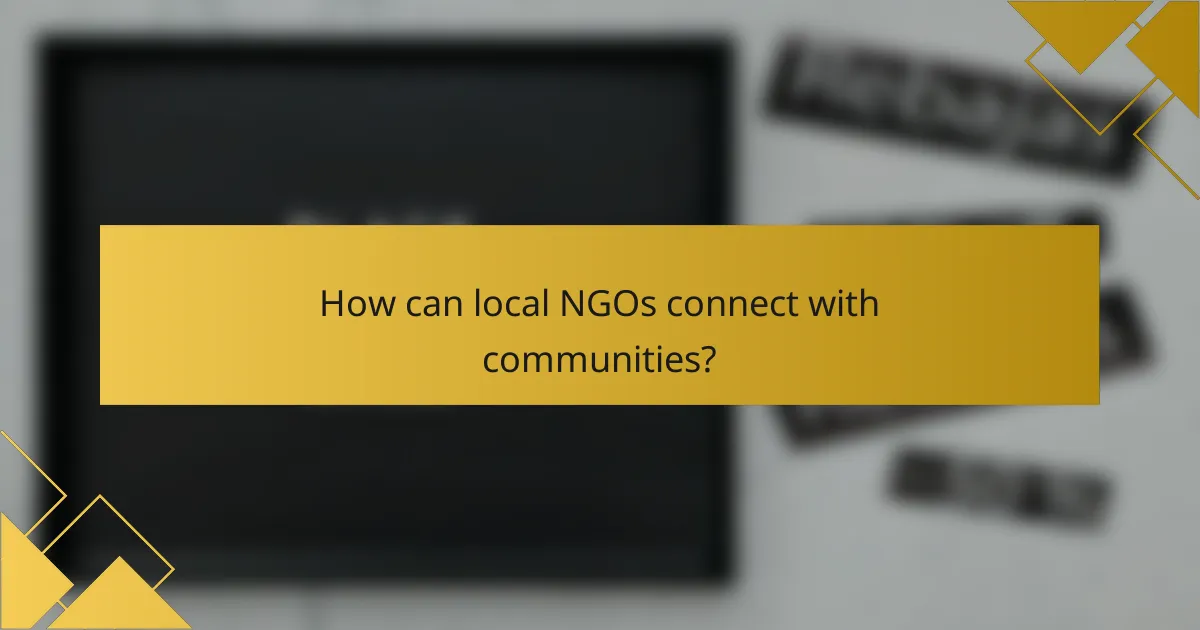
How can local NGOs connect with communities?
Local NGOs can connect with communities through various strategies that foster engagement and collaboration. These methods include outreach programs, partnerships with businesses, social media efforts, and volunteer recruitment events, all aimed at building strong relationships and addressing community needs.
Community outreach programs
Community outreach programs are essential for local NGOs to engage directly with residents. These initiatives often include workshops, health fairs, and informational sessions that address specific community issues, such as education or health awareness.
To be effective, NGOs should tailor their outreach efforts to the unique characteristics of the community, considering factors like demographics and cultural backgrounds. For example, offering bilingual services can significantly enhance participation in diverse neighborhoods.
Partnerships with local businesses
Forming partnerships with local businesses can amplify the impact of NGOs by leveraging resources and expertise. Collaborations may involve sponsorships, joint events, or in-kind donations, which can help NGOs expand their reach and effectiveness.
When approaching businesses, NGOs should clearly outline mutual benefits, such as increased visibility for the business and positive community impact. Engaging with small to medium-sized enterprises often yields fruitful relationships, as they may be more invested in local community development.
Social media engagement
Social media is a powerful tool for local NGOs to connect with communities and share their missions. By creating engaging content, NGOs can raise awareness, promote events, and foster discussions around important issues.
To maximize engagement, NGOs should utilize platforms popular in their communities, such as Facebook, Instagram, or Twitter. Regular updates, interactive posts, and community stories can help build a loyal online following and encourage offline participation.
Volunteer recruitment events
Volunteer recruitment events are crucial for NGOs looking to engage community members in their initiatives. These events can take various forms, including open houses, informational sessions, or hands-on workshops that showcase the NGO’s work.
To attract volunteers, NGOs should clearly communicate the benefits of volunteering, such as skill development and networking opportunities. Offering incentives like refreshments or small giveaways can also increase attendance and enthusiasm for participation.
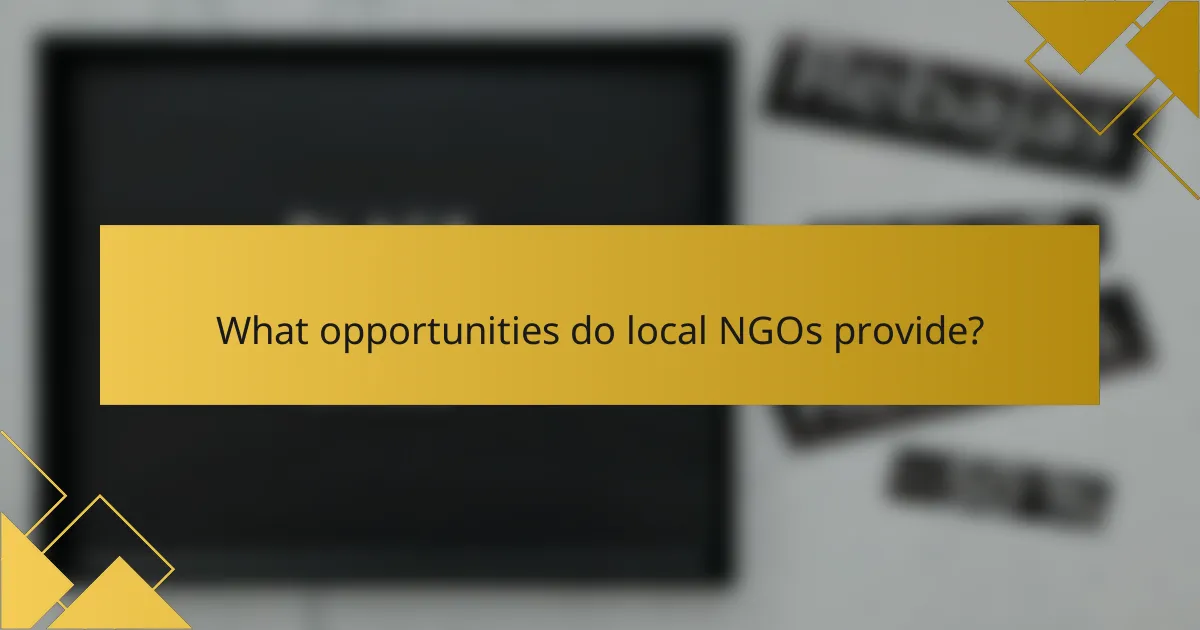
What opportunities do local NGOs provide?
Local NGOs offer various opportunities that can significantly enhance community engagement and development. These include job training programs, grant funding for projects, and networking events that connect individuals and organizations.
Job training programs
Job training programs provided by local NGOs equip individuals with essential skills needed for the workforce. These programs often focus on practical skills, such as computer literacy, trade skills, or customer service, catering to the needs of the local job market.
Participants can expect hands-on training, mentorship, and sometimes even job placement assistance. Many NGOs collaborate with local businesses to ensure that the training aligns with current employment opportunities.
Grant funding for projects
Local NGOs often offer grant funding to support community projects that address specific needs. This funding can be crucial for initiatives related to education, health, environment, or social services.
To access these funds, organizations typically need to submit a detailed proposal outlining their project goals, budget, and expected outcomes. It’s important to follow the application guidelines closely and demonstrate how the project will benefit the community.
Networking events
Networking events organized by local NGOs provide a platform for individuals and organizations to connect and collaborate. These events can range from informal meetups to formal conferences, allowing participants to share ideas and resources.
Attending these events can lead to valuable partnerships, funding opportunities, and increased visibility for local initiatives. It’s beneficial to come prepared with a clear pitch about your work and to actively engage with other attendees to maximize the experience.
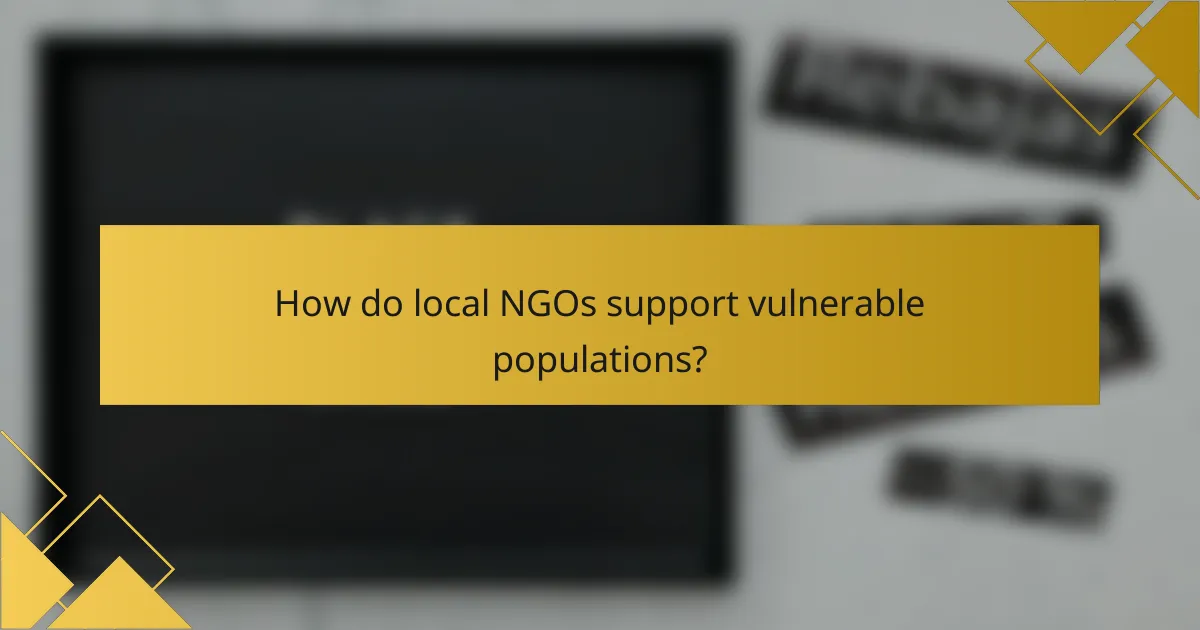
How do local NGOs support vulnerable populations?
Local NGOs play a crucial role in supporting vulnerable populations by providing essential services and resources tailored to their needs. These organizations often focus on food security, mental health, and housing stability, addressing immediate challenges while fostering long-term resilience.
Food assistance programs
Food assistance programs offered by local NGOs help ensure that vulnerable individuals and families have access to nutritious meals. These programs may include food banks, meal delivery services, and community kitchens that provide free or low-cost meals.
Many NGOs partner with local farms and grocery stores to source fresh produce, reducing food waste while supporting community health. Eligibility for these programs often depends on income levels, family size, and other factors, making it essential for applicants to provide accurate information.
Mental health services
Mental health services provided by local NGOs are vital for supporting the emotional well-being of vulnerable populations. These services can include counseling, therapy sessions, and support groups that address issues such as trauma, depression, and anxiety.
Access to mental health services is often free or offered on a sliding scale based on income, making them more accessible to those in need. NGOs may also conduct outreach programs to raise awareness about mental health issues and reduce stigma within communities.
Housing support initiatives
Housing support initiatives by local NGOs aim to provide stable living conditions for vulnerable populations. These initiatives may include emergency shelters, transitional housing, and assistance with finding affordable long-term housing options.
Many organizations work closely with local governments and housing authorities to ensure that individuals and families receive the necessary support. It is important for those seeking assistance to understand the application process and eligibility criteria, which can vary significantly by region.

What criteria should NGOs meet to be effective?
Effective NGOs typically meet several key criteria that enhance their impact and sustainability. These include having clear mission and vision statements, strong community ties, and transparent financial practices.
Clear mission and vision statements
A clear mission statement defines the NGO’s purpose and primary objectives, while a vision statement outlines its long-term aspirations. Together, these statements guide the organization’s strategies and help stakeholders understand its goals.
For example, an NGO focused on environmental conservation might state its mission as “to protect and restore natural habitats,” with a vision of “a sustainable world where biodiversity thrives.” This clarity helps in attracting support and resources.
Strong community ties
Building strong ties within the community is crucial for an NGO’s effectiveness. Engaging with local residents, understanding their needs, and involving them in decision-making fosters trust and collaboration.
NGOs can strengthen community connections through regular outreach programs, partnerships with local businesses, and participation in community events. This involvement ensures that the NGO’s initiatives are relevant and supported by those they aim to help.
Transparent financial practices
Transparency in financial practices is essential for maintaining credibility and trust among donors and the community. NGOs should regularly publish financial reports that detail income sources, expenditures, and funding allocations.
Implementing clear budgeting processes and adhering to recognized accounting standards can help NGOs demonstrate their financial integrity. This practice not only attracts funding but also reassures stakeholders that their contributions are being used effectively.
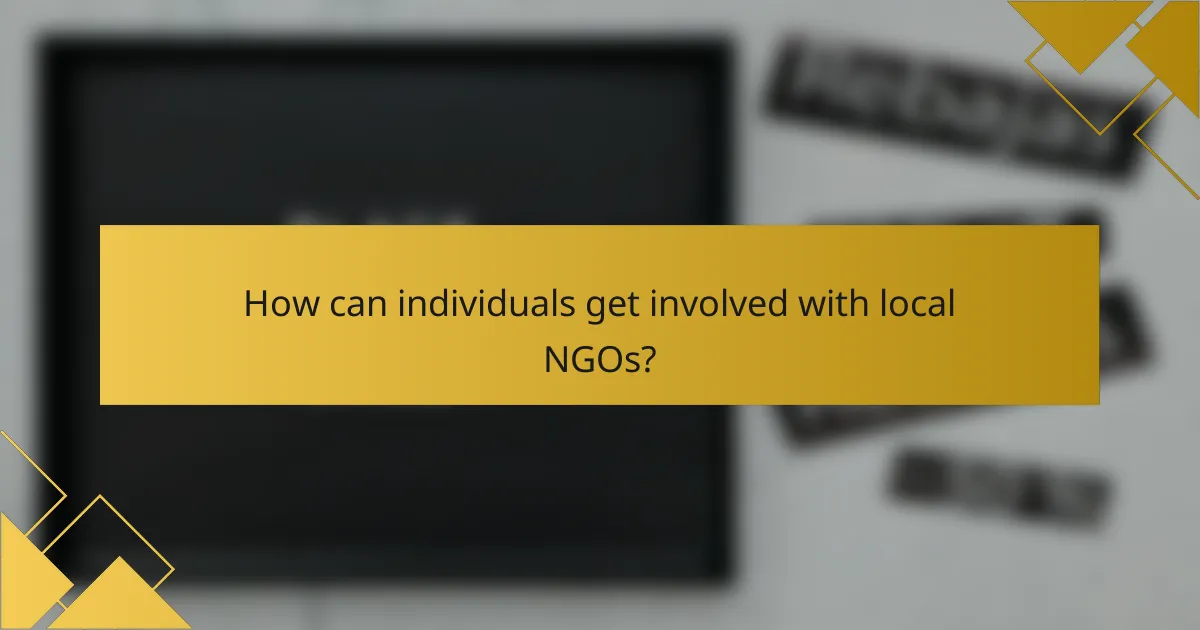
How can individuals get involved with local NGOs?
Individuals can engage with local NGOs through various means such as volunteering, donating, and participating in advocacy efforts. Each of these avenues offers unique ways to support community initiatives and make a meaningful impact.
Volunteering opportunities
Volunteering with local NGOs is a direct way to contribute time and skills to community projects. Many organizations seek volunteers for tasks ranging from administrative support to hands-on work in fields like education, healthcare, and environmental conservation.
To find suitable volunteering opportunities, check local NGO websites, community boards, or social media platforms. Consider your skills and interests when selecting an organization; for example, if you have a background in teaching, look for NGOs focused on education.
Donations and fundraising
Donating money or resources is another effective way to support local NGOs. Many organizations rely on financial contributions to fund their programs and initiatives, and even small donations can make a significant difference.
Individuals can also organize fundraising events, such as charity runs or bake sales, to raise money for their chosen NGO. When donating, consider whether the organization is transparent about how funds are used, as this can impact the effectiveness of your contribution.
Advocacy and awareness campaigns
Participating in advocacy and awareness campaigns helps raise public consciousness about important issues addressed by local NGOs. This can involve sharing information on social media, attending community meetings, or engaging in local policy discussions.
To get involved, follow local NGOs on social media and subscribe to their newsletters for updates on campaigns. You can also volunteer to help organize events that promote awareness of specific causes, such as environmental sustainability or social justice.
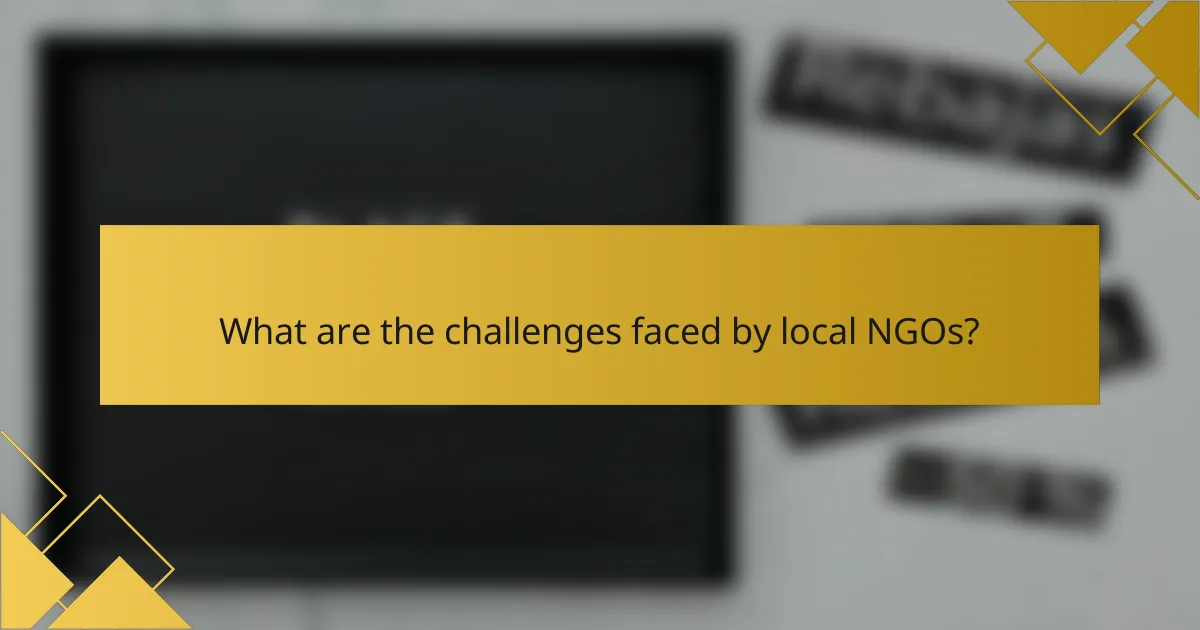
What are the challenges faced by local NGOs?
Local NGOs encounter various challenges that can hinder their effectiveness and sustainability. Key issues include limited funding, regulatory hurdles, and difficulties in community engagement.
Funding Limitations
Many local NGOs struggle with securing consistent funding, which is essential for their operations and project implementation. They often rely on grants, donations, and fundraising events, but competition for these resources can be fierce.
To navigate funding limitations, NGOs should diversify their income sources. This could involve applying for multiple grants, forming partnerships with businesses, or engaging in social enterprise activities.
Regulatory Challenges
Local NGOs must comply with various regulations that can be complex and time-consuming. These may include registration requirements, reporting obligations, and adherence to local laws governing non-profit activities.
To manage regulatory challenges, NGOs should stay informed about relevant laws and seek legal advice when necessary. Establishing a compliance checklist can help ensure that all requirements are met efficiently.
Community Engagement
Engaging the community effectively is crucial for local NGOs, yet it often presents challenges. Misunderstandings about the NGO’s mission or lack of trust can lead to low participation in programs and initiatives.
Building strong relationships with community members is essential. NGOs can host informational sessions, collaborate with local leaders, and actively solicit feedback to foster trust and encourage involvement.






